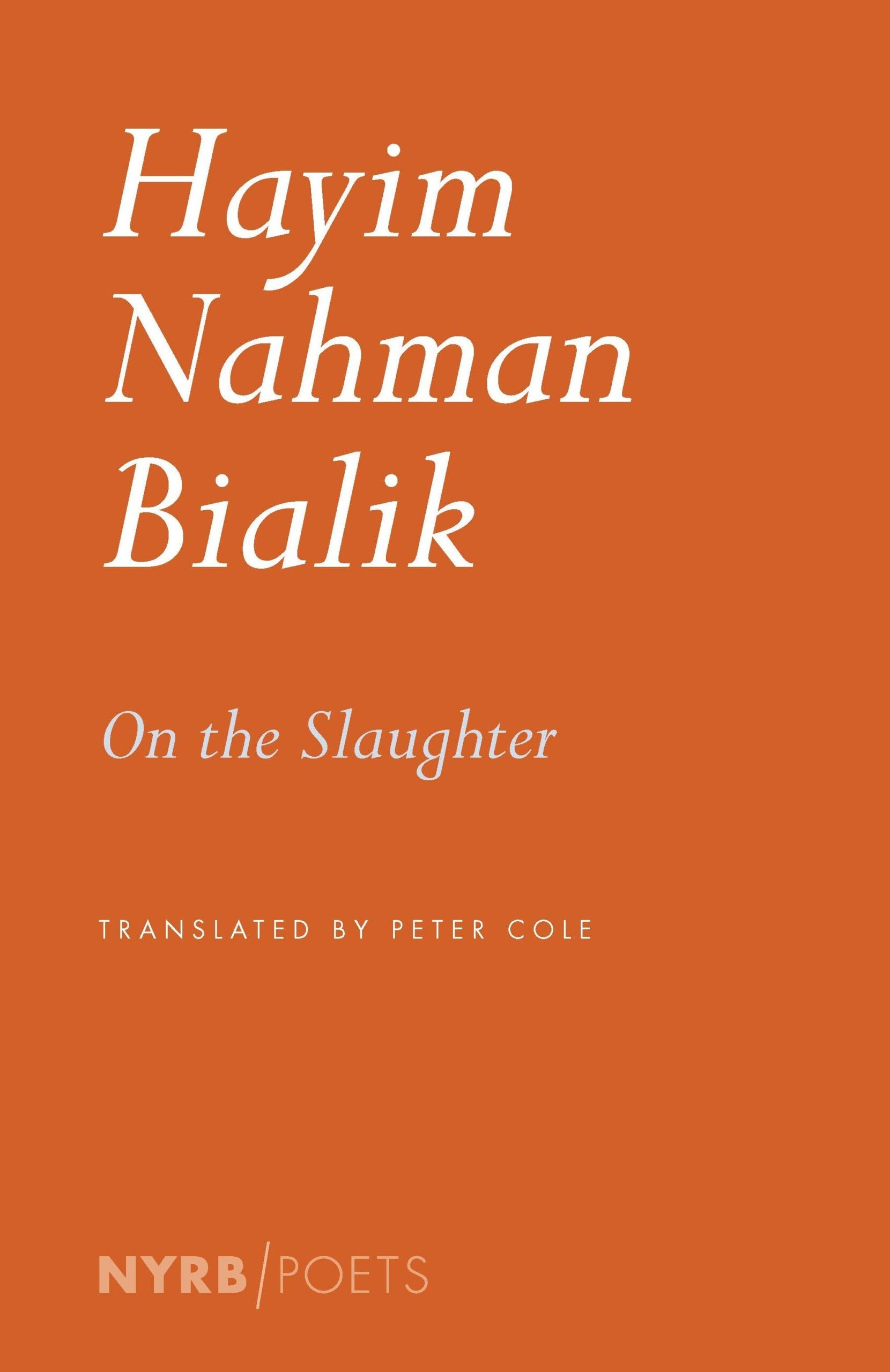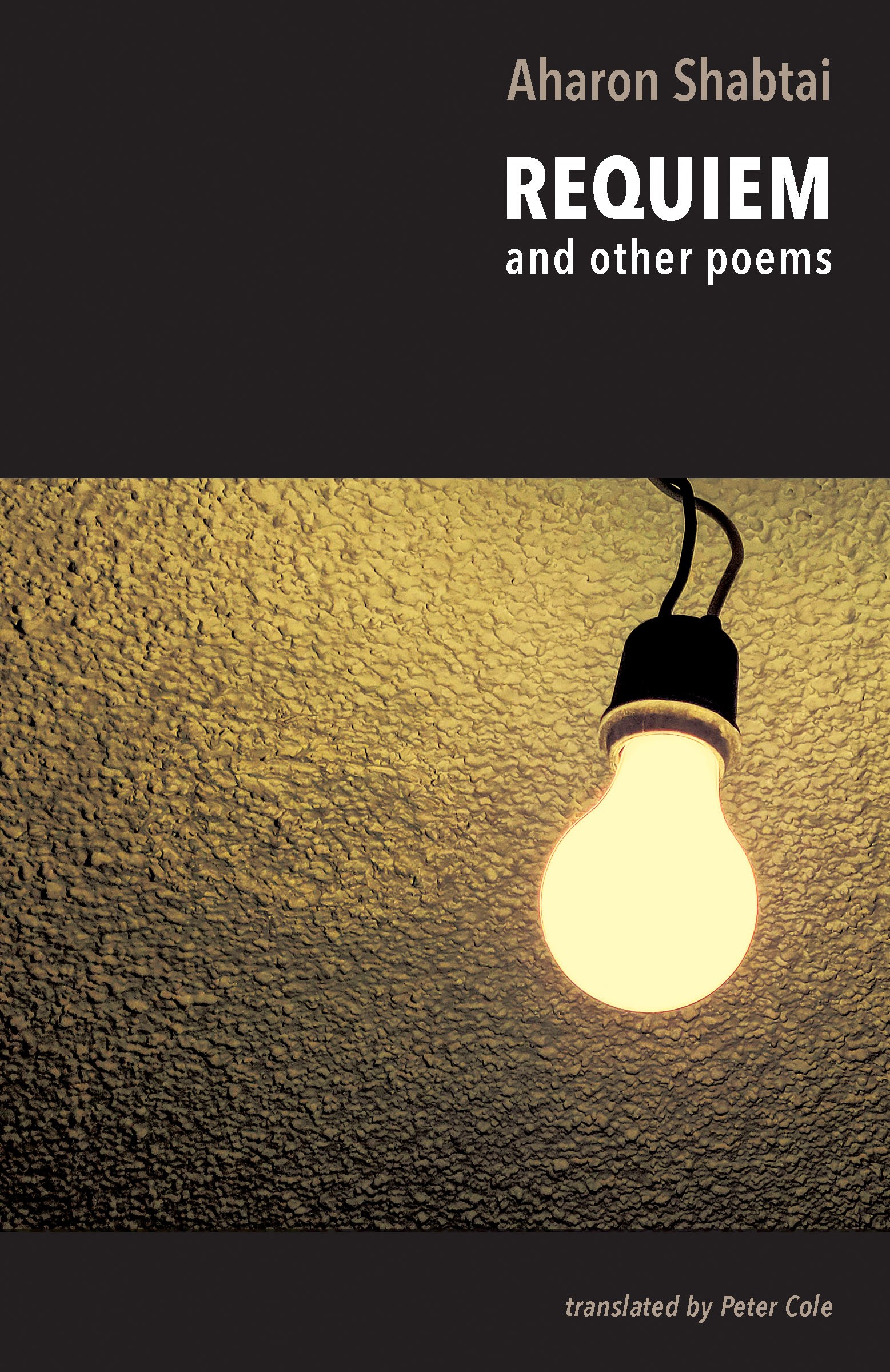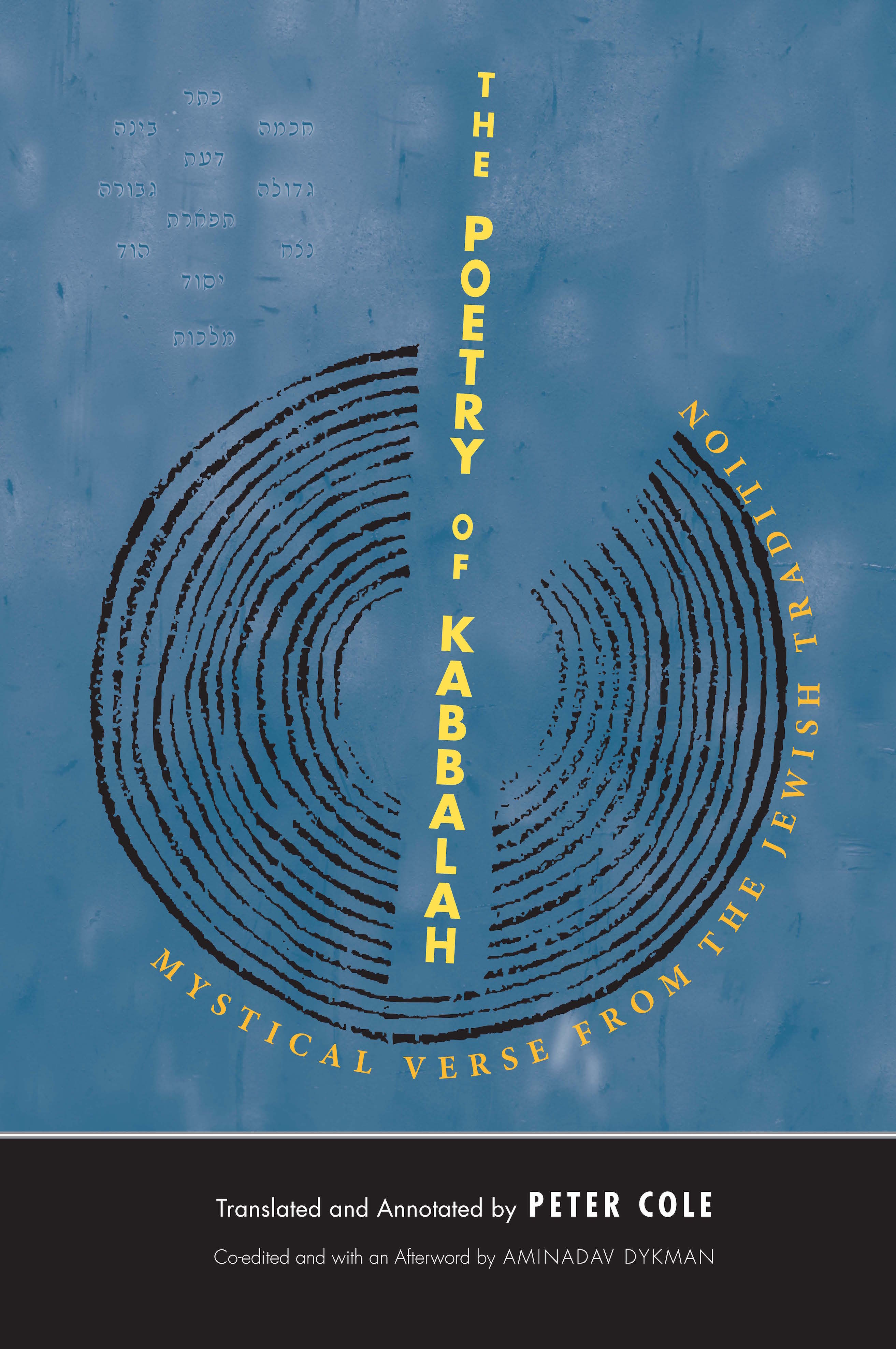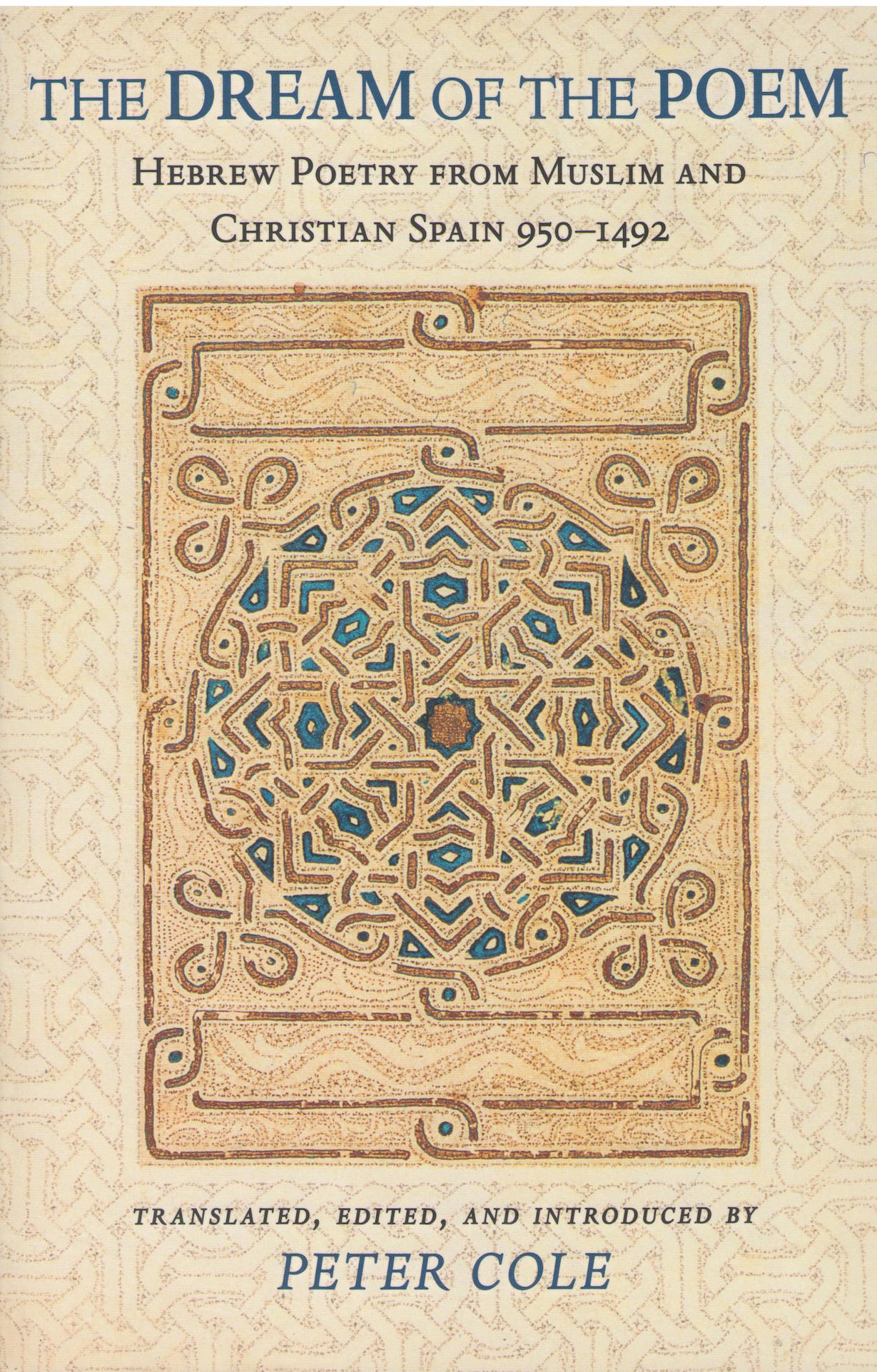PETER COLE
Translation
On the Slaughter
Hayim Nahman Bialik
NYRBooks, 2025
Few poets in the history of Hebrew have possessed the power and prescience of Hayim Nahman Bialik. Born in 1873 in a small Ukrainian village, he spent his most productive years in Odessa and in his fifties made his way to British Mandatory Palestine. He died in Vienna in 1934.
Bialik’s body of work opened a path from the traditional Jewish world of Eastern Europe into a more expansive Jewish humanism. In a line that stretches back to the Bible and the Hebrew poetry of Muslim and Christian Spain, he stands out—wrote Maxim Gorky—as a modern Isaiah. To this day he remains an iconic and shockingly relevant poet, essayist, and tutelary spirit.
Translated and introduced by MacArthur-winning poet Peter Cole, On the Slaughter presents Bialik for the first time in English as a masterful artist, someone far more politically and psychologically unsettling than his reputation as the national poet of the Jewish people might suggest. This compact collection offers readers a panoramic view of Bialik’s inner and outer landscapes: his visionary “poems of wrath” respond in startling fashion to the devastations of pogroms and a Jewish community in crisis, while his quietly sublime lyrics of longing, doubt, and withering self-assessment bring us into the silence at the heart of his art. The volume also includes a sampling of slyly sophisticated verse for children, and a moving introduction that bridges Bialik’s moment and our own.
“Bialik’s poetry flies up as ‘a hidden spark in the stone of my heart,’ and Peter Cole’s translations glow with that Kabbalistic spark. Here is the father of modern Hebrew poetry in electrifying modern English. Bialik died in 1934, but he seems an inescapable poet of our day.”
— Rosanna Warren
“No voice comes closer than Haim Nahman Bialik’s to capturing the agonizing interplay between Jewish hunger for redemption and the inadequacy of its devotees. Peter Cole—a major poet himself—has mastered the consummate master of contemporary Hebrew letters, rendering him into English with unrivaled clarity, erudition, and multilingual precision. Here is Bialik taking his rightful place in the larger poetic world.”
— Steven J. Zipperstein, author of Pogrom: Kishinev and the Tilt of History
“Like all great poetry, Hayim Nahman Bialik’s Hebrew verses are shockingly language-specific. Biblical and Talmudic resonances ring out in almost every line together with the strange freshness of an ancient language coming back to life. So I always thought that Bialik was untranslatable, until I read Peter Cole’s razor-sharp, sonorous, loving translations. What is more, Cole’s introduction to this volume may well be the best essay ever on Bialik and his oeuvre, as it brings out a devastating irony : the poet’s signature poem, ‘On the Slaughter’—written in the wake of the 1903 pogrom in Kishinev—reads today like a bitter, proleptic threnody for the victims of the massacre of October 7th; of the unthinkable, vengeful catastrophe of Gaza; and of the pogroms being perpetrated against innocent Palestinian villagers on the West Bank by savage Jewish settlers. Great books—and poems—have their own fate.” — David Shulman author of Dark Hope: Working for Peace in Israel and Palestine
“Once upon a time in Odessa, Hayim Nahman Bialik forged a modern Hebrew poetry, with a Biblical ear for lamentation, exile, longing, rage, blame, shame, and revenge along with an achingly contemporary recognition of their glorious, holy, and cursed echoes. Peter Cole makes these verses vivid, visceral, and chilling with both his prescient translations and his essential commentaries. — Charles Bernstein
“It’s here, Peter Cole’s translation of Hayim Nahman Bialik’s famous and infamous poetry about the April 1903 Kishinev pogrom along with a compact selection of the poet’s other visionary, strange, passionate, and mournful works, which are just as striking and durable in altogether different ways. These translations bring us a living voice, nuanced, melodic, orchestrated with touches of rhyme that seem inevitable, less the product of a translator’s will than of the desire of language itself. But first there is Cole’s introduction: so finely tuned, with pulsing syntax and shapely thought, readers might not be in a hurry to reach the poems. Until they do!” —Forrest Gander
“[Cole’s] translations do not merely bring Bialik into English — they interrogate how a poem travels across languages, epochs, and ideological terrains…. Bialik’s legacy speaks to the cost of violence and the necessity of reflection, and Cole’s translations succeed not in simplifying him, but in expanding the space in which we can meet him.” —Yogesh Patel, Hindustan Times
“If there was ever anyone to handle Bialik’s craft with acute passion, it is Cole…. A remarkable achievement.” —The Arts Fuse
“Cole refreshes a much-read poet, not by altering meaning but by drilling into syntax and opening it anew…. [He] restores the lyric voice that earlier translators neglect.” —PN Review
“[Bialik’s] poetry was and remains a great spiritual laboratory, among the greatest created in Jewish culture in the modern age.”
— Dan Miron, Columbia University
“His best and most essential work remains the most superb achievement of
modern Hebrew poetry.”
— Pinchas Sadeh
Requiem and Other Poems
Aharon Shabtai
New Directions, 2025
“Amidst the rubble, the haunted memories, the vengeful, the corrupt and the power-mad, in short, in the tragic maelstrom of this moment, how to mourn, what to celebrate, how to give voice both to the innocent victims of war and the ‘disciples of peace’? How affirm a shared humanity beyond the limits of religious, ideological and territorial claims? These are among the fraught questions renowned Israeli poet Aharon Shabtai raises in this moving late collection, skillfully translated by Peter Cole.”
— Michael Palmer
“Aharon Shabtai is the poet-conscience of Israel and one of the world’s great writers—a fact forever established by Peter Cole’s first-love-in-a-second-skin translations. Here is Shabtai’s shalom-song, his goodbye, good night, and good luck to all that, a requiem personal and political and tragically inextricable, ripped from the headlines as much as ripped from the heart.”
— Joshua Cohen
“Aharon Shabtai’s elegaic poems are all heart in Peter Cole’s magnificent translation. This is a poetry of the fragility of old age; a poetry of sorrow for a country whose peace he won’t live to see; a poetry that serves Memory, the mother of the Muses. As a renowned translator of ancient Greek poetry into modern Hebrew, Shabtai has the epigrammatic touch, that way of chiseling lines so that the words ring in the memory. His long ‘Requiem,’ which specifies the dead by their names and an illuminating anecdotal detail, should remind us all that the smallest particulars of a man or woman’s life are worth more in God’s ledger than any windy abstraction uttered by pundits, celebrities, activists, and politicians: ‘Before I fall asleep /// Grandpa Beier / undresses // and leaves / on the floor // a large, / clumsy hernia belt // like / a horse’s harness.”
— Ange Mlinko
“[Aharon] Shabtai’s poems … follow the words of Isaiah: ‘I will give to them … a memorial and a name … an everlasting name that will endure forever’.… But Shabtai’s verses are not just memorials to mortality. Their authentic power lies in their directness and attention to particularity, that is, in their presentness. …. Peter Cole’s translation … captur[es] the directness and the emotional power of Shabtai’s Hebrew verse…. [and] his poetic acumen graces all his translations…. The book can be read as a sustained meditation on oblivion, political, historical, personal.”
— Timothy Quinn, Restless Messengers
“The translation provided by Peter Cole works so smoothly throughout Requiem that the reader may feel Shabtai’s poems were originally written in English…. The poetry of Shabtai is needed now more than ever.”
— John Bradley, Rain Taxi
The Poetry of Kabbalah: Mystical Verse from the Jewish Tradition
“The Poetry of Kabbalah is the crown of Peter Cole’s sublime achievement as a poet-translator. Kabbalah is the alternate center of Judaic spiritual culture, not so much esoteric as superbly metaphoric. As poet and as imaginative exegete, Cole illuminates Kabbalah in the mode of Gershom Scholem and Moshe Idel.”
— Harold Bloom
“A monumental view of the poetry of Kabbalah that honors the Kabbalistic reverence for song-as-knowledge by translating Hebrew into English song: Cole’s versions are graceful, clear, and most important, tuneful. They live in the ear and the heart, in English, with their own transformative power.”
— Rosanna Warren
“This book is a well of poetry adn learning; famous or forgotten figures from the Jewish mystical tradition speak to us from their silences. Peter Cole has once again given us masterful translations.”
— Adam Zagajewski
“A veritable banquet of poetry that gives resonant voice to the depths of religious longing and passionate devotion…. With its combination of poetic beauty, learned commentary and short introductory essays, The Poetry of Kabbalah offers the reader a substantial survey of Jewish mystical history and thought through the channel of richly textured lyric voices.”
— Eitan Fishbane, The Forward
“Stunning…. Cole insists on [this poetry’s] relevance for the contemporary reader of poetry and, implicitly, for the secular Jew…. [He] chooses poems that seem to hover between mysticism and earthliness … [and] virtuosically shows that the poetry [of Kabbalah] continues to retain its more earthly function.
— Haaretz
“I’ve been reading and rereading …The Poetry of Kabbalah, an anthology of Jewish mystical verse translated by Peter Cole. This is ambitious poetry. It combines liturgical solemnity with outrageous flights of metaphor, and Cole’s versions match the originals step for step.”
— Robyn Creswell, Paris Review Staff Picks
“A groundbreaking work. Cole reveals and explores a subject that has hardly been noticed in previous scholarship or popular writing: the poetic aspect of Jewish mysticism. His translations are superb, his introductions to each section are clear and stimulating, and his notes are learned yet not intimidating, clarifying what would otherwise remain obscure. In short, he brings this material alive for a contemporary reader. This is a marvelous book.”
— Daniel Matt, author of The Essential Kabbalah and Translator of The Zohar: Pritzker Edition
“Peter Cole is one of our finest living translators, a marvelous poet, and an accomplished scholar. [The Poetry of Kabbalah] presents Kabbalistic texts from antiquity until the present in a way that conveys both their theological richness and sheer expressive, imaginative power. The translations are elegant, fluent, strikingly beautiful, yet faithful to the originals. They are accompanied by rich endnotes that lay out the abundance of scholarly discussion on the texts and by the Hebrew and Aramaic texts themselves, from ancient texts of ascension to contemporary Hebrew poetry.” — Yehuda Mirsky, Brandeis University (from “Five Must-Read Books about Kabbalah”)
The Dream of the Poem: Hebrew Poetry from Muslim and Christian Spain, 950—1492
Princeton University Press, 2007
“A treasure trove, a labour of love and exceptional erudition, which will open up to the reader a world of poetry and culture as rich as anything in human civilization…. The range is astonishing… and [Cole] has produced a book which is by turns moving, charming, and funny.”
— Gabriel Josipovici, The TLS
“A sterling work of translation of unsurpassed scope, quality and importance”
— Ross Brann, Cornell University
“Meticulously edited and captivating…. Poetic scholarship at its best…. A major translation project.”
— Marjorie Perloff, Bookforum
“Perpetually astonishing. The central figures in Peter Cole’s [Dream of the Poem] are great by any standards…. [They] provoke love in any reader of Hebrew literature, and by [a] miracle of Cole’s own creation, in any reader of little or no Hebrew who directly confronts the work of this major poet—translator.”
— Harold Bloom, The New York Review of Books
“An act of poetic creation of the highest magnitude…. [Cole’s] achievement in bringing us this volume is as death—defying an act as any ever undertaken by the poets he presents within its pages.”
— Esther Allen, Bomb Magazine
“Highly esteemed translator Peter Cole makes this survey of medieval Hebrew poetry a beguiling, soulful book.”
— The Financial Times, Books of the Year
“The Dream of the Poem is a book that no reader of poetry should be without, and Jewish readers should have it in their libraries, regardless of whether they usually read poetry or not. It’s just one of those strange things: a great book.”
— Shearsman (UK)
So What: New & Selected Poems, 1971—2005
Taha Muhammad Ali
Copper Canyon Press, 2006
Translated by Peter Cole, Yahya Hijazi, and Gabriel Levin
“Taha Muhammad Ali has been wonderfully served by his translators, so that his work in English has the defining effect of great poetry, which his to make the hair on the back of your neck stand up.”
— Scott McLemee, Barnes and Noble Review
“The translation from the Arabic is excellent.”
— Issa Boullatta, World Literature Today
“Quietly powerful and exceptionally moving.”
— The Boston Review
“So What is… more than a collection of poems; it’s an education. Introductions by poets and translators Peter Cole and Gabriel Levin (who worked on the book with Yahya Hijazi) are excellent overtures, [and] … the poems–one artist’s candid observations of a devastating, seemingly ceaseless conflict and of the land it inhabits–deserve star treatment…. From war comes art.”
— The San Francisco Chronicle
“An exceptional translation.”
— Rain Taxi
War & Love, Love & War: New and Selected Poems
Aharon Shabtai, New Directions 2010
“Richly textured [poems] … elegantly rendered into English; the translation succeeds in keeping intact Shabtai’s candor, his surrealistic imagery, audacity and inspired wordplay…. A brilliant collection.”
—Words Without Borders
“Gritty, controversial and intensely lyrical, this is an excellent collection from one of Israel’s most important contemporary poets….Cole has been able not only to capture the terse and poignant imagery, but also to preserve and intensify the poetry’s fiery syntactic energy.”
— The Forward
J’accuse
Aharon Shabtai, New Directions, 2003
“Aharon Shabtai’s J’Accuse, a slim volume in the prophetic vein, packs a terrific wallop…”
— The New York Times Book Review
“There is no one like Shabtai…. These lyrics of a patriot betrayed by his government are both timely and timeless…. They will endure long after their referents are forgotten.”
— Eliot Weinberger
“A masterpiece of searing indignation…. Shabtai is fortunate to have a translator as gifted as Peter Cole.”
— Journal of Arab Studies
“Stylistically and intellectually [Shabtai] is a poet of the first rank….. Cole’s versions are vivid poems in their own right.”
— Antioch Review
“Peter Cole’s translations superbly capture the stark rhythms and cadences of the original…. Accurate and representative, they bring to life a substantial segment of the work of this enormously high–charged and talented poet.”
— World Literature Today
Hebrew Writers on Writing
Edited by Peter Cole
Trinity University Press, 2008
“A deeply thought–provoking collection… inspirational.”
— Midwest Book Review
“A delightful selection from Hebrew writers reflecting on the act of writing itself.”
— Tikkun
“An invaluable new anthology…. [It] lays bare modern Hebrew writing not only as a literature of awakening and of salvation——individual and natioanl——but of revolt.”
— The Weekly Standard
“Cole’s introduction is one of the most elegant short surveys of the modern Hebrew revival. [Hebrew Writers on Writing is] a dynamic conversation across generations…. Cole has combed all manner of sources … in order to gather some of the finest voices of the Hebrew literature of the past century.”
— Lilith
Moods
Yoel Hoffmann, New Directions, 2015
“Gracefully composed poetic vignette about the inner and outer lives of a writer…. Wry, gentle, unique.
—Kirkus Reviews
“Passing thoughts and long-held memories intertwine in Hoffmann’s latest cabinet of curiosities…. Intensely personal … entirely universal.”
—Publishers Weekly
“Vividly pointillist in effect. …. It sounds meta and experimental but turns out to be utterly accessible and engaging; a fascinating work.”
—Library Journal
“Israel’s greatest living writer.”
—Harpers
“Hoffmann’s doubts about language are interwoven with … a wondrous, childlike faith that language does nothing less than hold the world together. There is also in Hoffmann’s writing a simple love of detail and observation … Added to this is a genuine fascination for the sounds of words, not only in Hebrew but also in German and Japanese. Words are analyzed and compared, struck against each other to see if there’s a spark. Hoffmann’s longstanding translator Peter Cole has conveyed this multilingual lexicon in a way that rings true to the English speaker’s ear. … [His] translation has the admirable quality of … connecting to the reader in a way that feels natural and uncontrived…. Moods is not only about something, it is something, vigorous and alive.”
—Music and Literature








